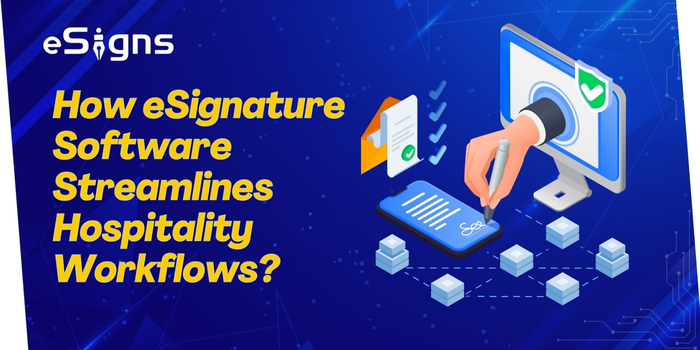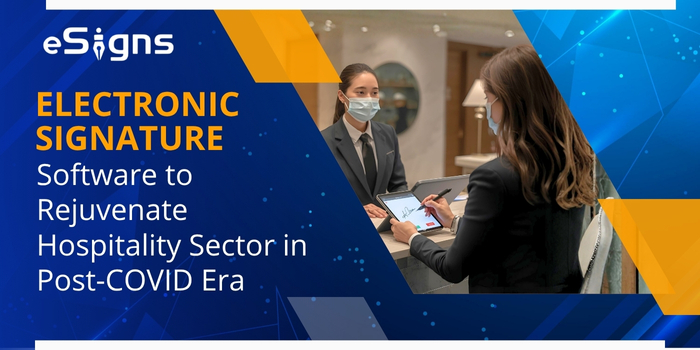During the COVID-19 pandemic, the tourism, travel, food, and hospitality sectors rely on one another for survival. Also, the top US-based hospitality brands accounted for 73% of revenue, totaling $245 billion in 2019. By April 2020, due to the global coronavirus pandemic, international tourist arrivals had dropped by 84%.
As reported by the American Hotel & Lodging Association Survey in 2020, 77% of hotels had laid off their staff. Though the hospitality sector got rejuvenated and strengthened in the post-COVID era, with electronic signature software and an online document management system.
Following the adoption of electronic signatures in the hospitality industry, hotel and restaurant businesses are bouncing back stronger with contactless, secure, and efficient operations that redefine the guest experience.
In this blog, you’ll be exploring streamlining the hospitality sector with advanced, smart, and automated workflows powered by top digital signature software–eSigns AI.
How Electronic Signature Software Fuels Digital Integration in Hospitality?
There was a sea change in consumer behavior today, expecting personalized services at their fingertips. To make that possible, the hospitality sector is on its way to building digital infrastructure.
However, the solution of eSignature for hospitality industry helps create and reshape the digital transformation of the hospitality sector. These days, electronic signature software and online document management systems are automating workflows securely with compliance.
With such a smart digital integration solution, hotels & resorts can streamline document signing and management processes—faster, paperless across departments. Hence, the right eSignature software like eSigns.io offers the hospitality industry AI-driven check-ins and reservations for a smooth & secure guest onboarding experience.
How eSignature Software Streamlines Hospitality Workflows?

The recovery of the hospitality sector post-COVID-19 hits differently. Leaders have rejuvenated everything with a new business model that simplifies workflows digitally. By incorporating top electronic signature software solutions, the hospitality sector can offer a personalized, data-driven guest experience.
The key features of eSignature tools, like automation, cloud-based services, mobile-first technologies, and AI analytics, shed light on customer behavior and boost everyday workflows.
Curious to explore how an electronic document management system simplifies hospitality workflows digitally? Dive in:
1. Automation for Seamless Workflow:
The hotel industry has traditionally relied on legacy technologies for bookkeeping practices and guest management. However, modern electronic signature for hospitality industry offers the necessary tools to digitize customer information as contact types.
The hospitality sector can help customers to make online room bookings and check in on arrival. eSigns online signature software simplifies end-to-end solutions for the hospitality sector with a centralized dashboard. It displays occupancy rates, future bookings, and expected tourist arrivals in real-time.
2. Cloud-Based Services for Hospitality Operations:
The hospitality sector now depends on cloud-native platforms that are both flexible and scalable. These systems help guests and hotel staff process documents for reservations, check-ins, check-outs, occupancy rates, and payments—all through a secure electronic signature platform.
Unlike traditional technologies that rely on legacy architecture, cloud-based applications allow the industry to build and offer customized customer services. Hence, hotels can drive a seamless guest experience with modern cloud-based & scalable eSign and online document management services.
3. Mobile-First eSignature Solutions for Anytime, Anywhere Access:
Electronic signature platforms are compatible with multiple devices, including laptops, desktops, tablets, and mobile devices. The customers can access this software remotely to sign consent forms, payment vouchers, check-in & check-out forms online.
It ensures an efficient & contactless guest experience via multi-device compatibility from anywhere, anytime.
4. AI-Driven Insights and Smart Analytics:
With an electronic document management system, the fusion of AI and ML analytics sheds insights into customer actions. The hotel management can easily get details about customer room reservations, signed or unsigned paycheques, and more.
Besides, the hospitality sector can collect data if a customer declines to sign a document. The digital signature software tools automatically send alerts on customers’ reactions once they receive their communication instantly.
5. Ensures Document Security and Data Privacy:
Customers’ sensitive data stored in the cloud-based electronic signature document management system remains safe, secure, tamper-proof, and legally compliant. Using digital signature software, hackers and fraudsters cannot tamper with signed documents.
The sensitive data, like banking details and mobile numbers, is stored safely and securely using eSigns’ eSignature tool.
6. Tailored & Personalized Customer Services:
The hospitality sector can create customized documents using electronic signature software. It can be offering letters, sales deeds, or vendor agreements; an eSignature tool serves its clients as per their personalized needs.
7. Speed, Accuracy, and Productivity:
The best eSignature for hospitality allows hotels to reach out to guests instantly to grab or consolidate new business. It helps the industry in maintaining documents in a way to scale their operations digitally.
Conclusion:
The hospitality sector, which is on the verge of collapse during the pandemic, has gradually rejuvenated. Now, the industry circles are happy about the return to normality the COVID-related sanctions are fading out.
After exploring this blog–Electronic Signature Software to rejuvenate hospitality sector in post-COVID era’, hotels should embrace this digital transformation. Also, by incorporating AI-powered eSigns electronic document management solutions, your firm can boost productivity and lead the hospitality marketspace.
Check out our latest and informative data on eSignature and the online document management system through the eSigns blog page.
Frequently Asked Questions
1. What is an electronic signature software?
A: An electronic signature (or eSignature or eSign) software is a secure digital platform that allows authorized users to sign documents electronically with security and compliance.
2. What is the best electronic signature software for hospitality services?
A: eSigns is the best electronic signature software for hospitality services–as it simplifies daily operations through automated, compliant, and AI-powered digital workflows. As a result, your guests and clients can experience a fast, paperless, and contactless journey.
3. Are eSign and digital workflow solutions legally compliant?
A: Of course, eSigns eSignature and digital workflows solutions are legally valid and comply with local laws. Hence, hotels can use our electronic signature software for safe and compliant agreements.
4. Will eSigns’ eSignature for hospitality ensure data safety and customer privacy?
A: Yes, eSigns.io electronic signature software for hospitality industry ensures your signed documents are legally binding, tamper-proof, and authentic.
5. Can guests sign documents on any device using eSignature software?
A: Yes, guests can sign documents anytime, anywhere with the help of the best eSignature software for the hospitality industry.

